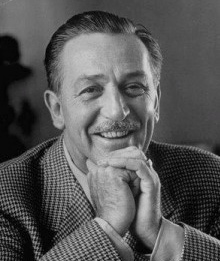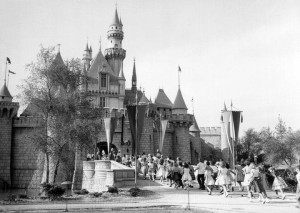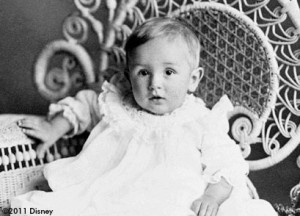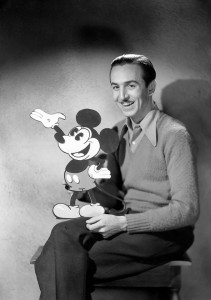Disney.
For many, like me, the very name delights the heart and conjures up images of whimsy and “magic.” For others, perhaps those less childish at heart, it denotes something flimsy, artificially sweet and, well, too childish.
Naysayers should consider both the man and the institution. He (Walter Elias Disney), nearly 115 years after his birth, is still one of the most admired men in entertainment, still holding the personal record for the most Oscars ever awarded an individual. The institution, likewise, stands the test of time. It is the largest American-owned entertainment conglomerates in the world (owning ABC, ESPN, LucasFilm, The Muppets, Marvel and more). [How something shoddy came to be labeled as “Mickey Mouse” is beyond me; the Walt Disney Corporation is the epitome of quality and excellence.]
This year marks The Disneyland Park’s 60th anniversary. Disneyland—the Happiest Place on Earth—is the man’s crowning lifetime achievement. Opening July 17, 1955—a year and a day after groundbreaking—the resort remains the benchmark against which all other theme parks are measured. But why?
Could the magic of Disney be accredited to something spiritual?
I love Disneyland! I try to make a yearly pilgrimage. I find it a place where my batteries are recharged; where I can be re-inspired and rejuvenated. I enjoy the rides and the shows and the other attractions, but, more than that, I just enjoy the place. I can sit in the Magic Kingdom and soak in something, well, spiritual. No, I don’t worship Disney, but I do appreciate it. Like church, or out in the forest, or by the sea, it is a place where I feel closer to my Creator. I suspect this is because I, too, am a creator, as was Walt Disney.
There’s something spiritual about emulating the One who made you to be in His image. And, thus, my thought is that there may be more to Disney success and universal appeal than meets the uncritical eye.
So what is the secret to the Disney magic?
There are many theories and ideas. The institution’s imagineers are much studied. The company’s policies are taught by the Disney Institute and modeled world-wide by corporations seeking to harness the success for themselves. I could list the company’s ideals here, but that is not the point. Perhaps this story, told by Mike Vance, former Dean of Disney University where “cast members” (meaning employees in Disney parlance) learn the Disney Way, about Walt can best illustrate:
A little boy from Terahute, Indiana approached Walt Disney one day as he strolled through his Magic Kingdom and asked the icon how he, too, could achieve his dreams.
“Think, Believe, Dream, Dare,” said Mr. Disney. “Think about the values and principles that guide you. Believe in yourself, based on the values and principles that guide you. Dream of something you want to do, believing in yourself, based on the values and principles that guide you. Then, dare to make that dream come true, believing in yourself, based on the values and principles that guide you.”
A simple formula to be sure. If you study the life of Walt Disney, as I have, you’ll see the formula working over and over again. Take the film “Saving Mr. Banks,” for example. The film depicts Walt Disney, ably played by Tom Hanks, as a relentless man. Other biographical films about Disney like “Walt Before Mickey” and “As Dreamers Do” also portray that character. So what gave the man that passionate nature? Again, was it something spiritual?
The Formative Years
Born in 1901, Walt Disney was raised attending the Congregational church where his father, Elis, was a deacon and occasionally filled the pulpit. A strict and demanding disciplinarian, Elias was known to ride his children hard and met out corporal punishment as he deemed fit. Walt’s mother was the church organist. And Walt, baptized when he was two years of age, was named for the church’s preacher Walter Parr.
But Walt’s father, by several accounts (though Walt rarely spoke an ill word about the man), was an authoritative and dogmatic man. And so Walt left home at the age of 17, falsifying his birth record, to join the army. In his adult life, perhaps because of the sanctimonious religion of his youth, he was not known to frequent church. However, his life work does reflect religious themes, and he insists that his faith remained with him and was what carried him through life.
Walt’s oeuvre, while remaining almost devoid of religious reference, tends to illustrate faith themes (primarily good’s triumph over evil) and Christian values. Philip Longfellow Anderson explores each of his animated classics in his enlightening book “The Gospel According to Disney.” Others, too, have commented on the spiritual nature of his product (some, the very same people who admire the works of Tolkien and Lewis, even accuse it of being occult-ish).
But perhaps the man should speak for himself. In 1963, religious writer Roland Gammon contacted fifty-five prominent Americans, including Walt Disney, asking each of them the same question: “What is your faith and what part has it played in your life achievement?” The results were published in his book entitled Faith is a Star (New York E. P. Dutton and Company).
Walt’s essay, titled “Deeds Rather Than Words,” contains the following:
“In these days of world tensions, when the faith of men is being tested as never before, I am personally thankful that my parents taught me at a very early age to have a strong personal belief and reliance in the power of prayer for Divine inspiration. My people were members of the Congregational Church in our home town of Marceline, Missouri. It was there where I was first taught the efficacy of religion …
“Every person has his own ideas of the act of praying for God’s guidance, tolerance, and mercy to fulfill his duties and responsibilities. My own concept of prayer is not as a plea for special favors nor as a quick palliation for wrongs knowingly committed. A prayer, it seems to me, implies a promise as well as a request; at the highest level, prayer not only is a supplication for strength and guidance, but also becomes an affirmation of life and thus a reverent praise of God.
“Deeds rather than words express my concept of the part religion should play in everyday life. I have watched constantly that in our movie work the highest moral and spiritual standards are upheld, whether it deals with fable or with stories of living action. This religious concern for the form and content of our films goes back 40 years…
“Both my study of Scripture and my career in entertaining children have taught me to cherish them… Life is composed of lights and shadows, and we would be untruthful, insincere, and saccharine if we tried to pretend there were no shadows. Most things are good, and they are the strongest things; but there are evil things too, and you are not doing a child a favor by trying to shield him from reality. The important thing is to teach a child that good can always triumph over evil, and that is what our pictures attempt to do…
“Thus, whatever success I have had in bringing clean, informative entertainment to people of all ages, I attribute in great part to my Congregational upbringing and my lifelong habit of prayer. To me, today, at age sixty-one, all prayer, by the humble or highly placed, has one thing in common: supplication for strength and inspiration to carry on the best human impulses which should bind us together for a better world. Without such inspiration, we would rapidly deteriorate and finally perish.
“But in our troubled time, the right of men to think and worship as their conscience dictates is being sorely pressed. We can retain these privileges only by being constantly on guard and fighting off any encroachment on these precepts. To retreat from any of the principles handed down by our forefathers, who shed their blood for the ideals we still embrace, would be a complete victory for those who would destroy liberty and justice for the individual.”
His daughter Sharon notes that her father “was a very religious man, but he did not believe you had to go to church to be religious… He respected every religion. There wasn’t any that he ever criticized. He wouldn’t even tell religious jokes.”
Walt wrote a letter to his sister Ruth in 1943, about his other daughter Diane (then about ten years old) that read: “Little Diane is going to a Catholic school now, which she seems to enjoy very much. She is quite taken with the rituals and is studying catechism. She hasn’t quite made up her mind yet whether she wants to be a Catholic or Protestant. I think she is intelligent enough to know what she wants to do, and I feel that whatever her decision may be is her privilege. I have explained to her that Catholics are people just like us and basically there is no difference. In giving her this broad view I believe it will tend to create a spirit of tolerance within her.”
Later Diane (Disney Miller) in answering why there was no church on Main Street at Disneyland said it was because her father did not want to favor any particular denomination (even though he’d originally planned to include one). [A non-denominational chapel has been included at Walt Disney World Resort.] It should also be noted that the Reverend Glenn Puder, Walt’s nephew-in-law, at Walt’s request, delivered the invocation at Disneyland’s dedication. Catholic, Jewish and Protestant clergy were each representative at the ceremony.
Finally, Walt Disney has been compared to his most noteworthy animated creation: Mickey Mouse. Many biographers have affirmed the similarity between the man and his mouse. Though not Mickey’s primary draftsman, Walt did direct the stories and voice the character (from 1928 to 1940).
Of Mickey preacher/author Tony Campolo said, “[He’s] Adam before the fall. He’s a purely innocent creature. And he’s never done anything sinful in his life… Look at the fifth chapter of Galatians, where Paul talks about the fruits of the Holy Spirit. They are these: love and joy and peace and patience. All of these godly virtues are wrapped up in Mickey…”.
Conclusion
So, I believe that Walt Disney was (at least by his own confession) a Christian and primarily a good man. Flawed like the rest of us to be sure, but definitely a man formed and driven to express the Divine. And I often weep at the beauty of his creativity—truly a gift from God. How could it not be?
J.R.R. Tolkien [The Hobbit, The Lord of the Rings] once said that he never aimed to write Christian allegory; that his faith, “like leaf mold on the forest floor” just worked its way into his story. I think this happens with all story-tellers. Part of who you are finds its way into your work. Well, Walt was a story-teller, too, and I believe that the faith that guided him was manifest in the body of his work. And that is why Disneyland is such a spiritual place for me. God is there, as He is an all of art (no matter what the intent) because without the creative nature He has given each of us we could not create.
“I believe firmly in the efficacy of religion, in its powerful influence on a person’s whole life. It helps immeasurably to meet the storm and stress of life and keep you attuned to the Divine inspiration. Without inspiration, we would perish. All I ask of myself, ‘Live a good Christian life.’ To that objective I bend every effort in shaping my personal, domestic, and professional activities and growth.”
~Walt Disney, Guideposts magazine (1949)
For more information and an excellent essay read: http://www.christianitytoday.com/ct/2009/novemberweb-only/fofdisney.html?start=1
Grgeory E. Zschomler is an author living in Cannon Beach. His Bayou Boys Adventures for middle-readers and other works like “The Amish vs. the Zombies” (a YA novel) are faith-based.




Great article. I only WISH I could go to Disneyland every year for I, too, share your perspective on its spiritual and creative rejuvenation. I can’t complain, however. I owned an ‘Annual Pass’ for several years while living in California. I even spent one year attending twice monthly with my toddler daughter! And that long quote of Disney was revelatory! I’ve never heard him speak that directly of his faith and perspective on prayer. Thank you for digging it up. How I admire his boldness in not hiding shadows from children and his openness to people of all faiths. Thanks, Mr. Z!
Thanks for your comments, Rick.. I appreciate your thoughts.
This just in: New Stuff at Disneyland for the 60th: http://www.latimes.com/business/la-fi-disneyland-60th-anniversary-20150128-story.html